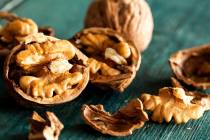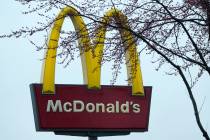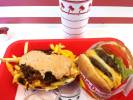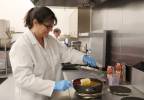As vending machines spread, some wonder about future of service
UNLV student Angela Clements had a bold prediction as she gazed across a commons area at the University of Nevada, Las Vegas, one afternoon last week.
"It will," she said, "be the end of customer service."
Not good customer service. Not bad customer service. Just customer service in general. Because what Clements was taking in as she looked across the space crowded with dozens of students was a brave new world of food service, courtesy of vending machines.
Vending machines that whip up cotton candy while you wait. Vending machines that have face-scanning technology in case, for example, Jell-O decides it wants its Temptations line sold just to adults. Vending machines that can be paid with a smartphone.
And the Pepsi Social Vendor, where someone can pay for a friend's future drink, leaving a message or even a video to accompany it. Give your friend the code and he or she can come back and pick up the drink and the message.
No wonder the zombies wandering through the crowd wore T-shirts promising, "The vend is near."
Clements and friend and fellow student Alexa Matteos were standing near a Seattle's Best coffee machine that grinds the beans after you insert your money and that can handle way more than a traditional cup of coffee, whipping up a latte or just about anything else your caffeine-lovin' little heart desires.
"I love this," Matteos said as she cradled a cup of coffee hot from the machine. "This is so cool. I don't have to deal with Starbucks."
That was when Clements made her prediction about barista extinction, and Matteos nodded eagerly.
"If you mess up, it's your fault," she said. "But we won't have to deal with people anymore" - which could still be a problem, because several of the machines were out of order.
The machines on the UNLV campus were displayed by the National Automatic Merchandising Association, the vending-machine trade group that had a show at the Sands Expo and Convention Center later in the week. One of Clements' and Matteos' favorite machines was 2BU, which contained only healthy snacks and offered touch-screen nutritional information.
"It's like Whole Foods in a machine," Matteos said.
The association is making it easier for vending-machine operators to showcase healthful wares through its Fit Pick program, in which stickers are applied to say what's inside. The program, a representative said, has been particularly popular among the U.S. military.
Several people showcased healthy options at the vending-machine trade show, with some difference of opinion about the corresponding enthusiasm of the American public. At the Reichel Foods Inc. booth, vice president of sales and marketing Greg Wilson said the company's Dippin' Stix - primarily things such as apples with a caramel dip or carrots with ranch dip - said sales had grown 40 percent in each of the past three years.
At the Chicken of the Sea booth, however, director of food service sales Dennis Fitzgerald said vending-machine sales of his product were flat.
"They say they're looking for healthy, but they still want to eat a doughnut," Fitzgerald said.
The company, though, apparently remains optimistic. Fitzgerald said it's about to roll out Coastal Cuisine, boxes that contain a packet of rice and one of tuna, sauce and vegetables; both are microwaved and then can be eaten from the interior of the glazed box.
At the Del Monte Foods booth, Western regional manager Glenn Durflinger said healthful food remains the exception in vending machines.
"There's not a lot of it out there," he said.
Del Monte, Durflinger said, has been marketing cans of its fruits in vending machines for 20 years. Selling refrigerated fruit in vending machines has been problematic because of limited shelf life. Del Monte is trying to combat that, he said, with a new line that uses citric acid and special packaging to make the fruit shelf-stable. Also popular - primarily in schools - is the Squeezable Fruit line of puree in a sort of flat tube, each one containing one serving of fruit.
"Grab-and-go is a big thing right now," Durflinger said. "There are all these new ministores that are trying to get into grab-and-go." In some cases, groups of vending machines are positioned to create a sort of minimarket, as in some motels, office complexes and similar properties.
Heather Harrell, regional sales manager for PopChips, said savvy marketing of healthier items is key. PopChips, which have half the fat of fried chips and less than 180 milligrams of sodium per bag, purposely doesn't emblazon its packaging with "healthy" or anything similar.
While she maintained that consumers are looking for healthier options, she added, "People don't want compromise."
At the Dole booth, Earl Williams, national sales manager for vending and convenience stores, said its new Fruit Bowls Fruit in Juice snacks are shelf-stable and can be placed in conventional snack machines.
"It's as healthy a fruit as you can get," Williams said.
But he, too, was realistic about American tastes.
"I still say people talk healthier than they actually eat," Williams said. "They know that Snickers bar is in the machine before they get to that machine. That's why they go to a snack machine."
Still, he said, demand for snacks such as fruit is up, particularly in schools and health care settings, and "some corporations demand it."
And Williams maintained that if a consumer headed for a machine for a Snickers sees a package of fruit, he or she may not pick the fruit, but may return for it on another snack-machine trip.
The association said vending is a $42-billion-a-year industry, and that 100 million Americans use one of 7 million machines each day. Healthful snacking remains a small part of that.
Still, Williams said, "it's growing."
Contact reporter Heidi Knapp Rinella at hrinella@reviewjournal.com or 702-383-0474.































